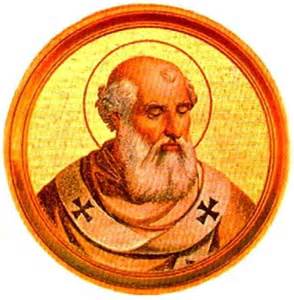St Zachary’s Day
St Zachary (679-752) was elected pope in 741 and immediately became involved in a political dispute that had long-lasting consequences in medieval church-state relations.
In the mid-8th century the situation of the papacy was perilous. Italy had been almost entirely overrun by the barbarian Lombards and the power of the Eastern Roman Empire to protect its territory in the peninsula was waning. Moreover, the papacy was at odds with the Emperor over the newly-adopted policy of iconoclasm, the pope taking the position that the Byzantine government had no right to interfere in church matters.
Fortunately Zachary proved to be an able diplomat with the ability to charm the Lombard ruling class. Not only did the pope persuade the Lombards to halt their proposed invasion but he also convinced them to return territory they had already conquered. When the Lombards seemed ready to invade the Byzantine holdings around Ravenna, it was again Zachary who saved the day.
By this time it was clear to all that the arm of the eastern empire was no longer strong enough to protect Italy from barbarian incursions and a new protector had to be found. Zachary had always interested himself in the affairs of the most powerful force in the West, the Frankish kingdom. He had encouraged St Boniface’s attempts to reform the lax and corrupt Frankish church and to extend Christianity to the pagan tribes in the German lands.
In 751 he received a letter from Frankish nobles inquiring whether the title of king belonged to the one who had exercised the power or the one with the royal lineage. This was a way of asking whether the Mayor of the Palace, Pepin the Short, who was the de facto ruler, could depose the last of the useless Merovingian dynasty, Childeric III. Zachary, who saw the Franks as the future defenders of the papacy, gave the go-ahead to the coup by replying that the one with the real power should also wear the crown. Childeric was shorn of his long hair, symbol of his kingship, and placed in a monastery. Pepin was crowned king and founded the Carolingian dynasty whose greatest ruler was Pepin’s son, Charlemagne.
In sanctioning this deposition, the papacy signalled a turning away from the Byzantine throne and a turn to the west and the Franks. This move would be given symbolic force on Christmas Day 800, when the pope crowned Charlemagne as Emperor. Pepin had unwittingly given the papacy a chance to claim that political legitimacy originated with the popes, that they could make, or unmake, kings and emperors. This is an idea that caused centuries of turmoil in Europe but which also helped firm up the notion of a church-state separation which was indispensable to the development of political theory in western Christendom. Those seeking to understand the reasons why political life developed differently in the West than in Orthodox lands or in Islam should start with Pope Zachary.
